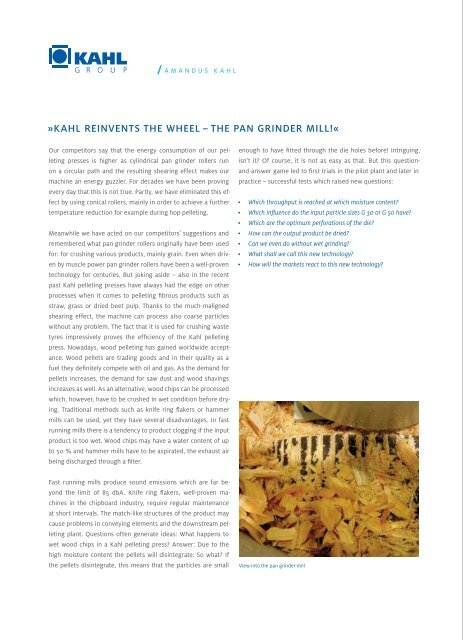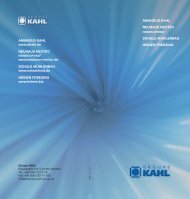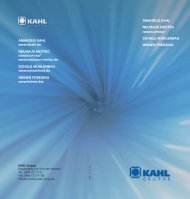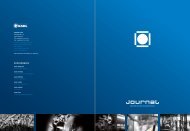Subsidiaries - Amandus Kahl Group
Subsidiaries - Amandus Kahl Group
Subsidiaries - Amandus Kahl Group
You also want an ePaper? Increase the reach of your titles
YUMPU automatically turns print PDFs into web optimized ePapers that Google loves.
amandus kahl<br />
»KAHL REINVENTS THE WHEEL – THE PAN GRINDER MILL!«<br />
our competitors say that the energy consumption of our pel-<br />
leting presses is higher as cylindrical pan grinder rollers run<br />
on a circular path and the resulting shearing effect makes our<br />
machine an energy guzzler. For decades we have been proving<br />
every day that this is not true. partly, we have eliminated this ef-<br />
fect by using conical rollers, mainly in order to achieve a further<br />
temperature reduction for example during hop pelleting.<br />
meanwhile we have acted on our competitors' suggestions and<br />
remembered what pan grinder rollers originally have been used<br />
for: for crushing various products, mainly grain. Even when driv-<br />
en by muscle power pan grinder rollers have been a well-proven<br />
technology for centuries. But joking aside – also in the recent<br />
past kahl pelleting presses have always had the edge on other<br />
processes when it comes to pelleting fibrous products such as<br />
straw, grass or dried beet pulp. Thanks to the much-maligned<br />
shearing effect, the machine can process also coarse particles<br />
without any problem. The fact that it is used for crushing waste<br />
tyres impressively proves the efficiency of the kahl pelleting<br />
press. nowadays, wood pelleting has gained worldwide acceptance.<br />
Wood pellets are trading goods and in their quality as a<br />
fuel they definitely compete with oil and gas. as the demand for<br />
pellets increases, the demand for saw dust and wood shavings<br />
increases as well. as an alternative, wood chips can be processed<br />
which, however, have to be crushed in wet condition before drying.<br />
Traditional methods such as knife ring flakers or hammer<br />
mills can be used, yet they have several disadvantages. In fast<br />
running mills there is a tendency to product clogging if the input<br />
product is too wet. Wood chips may have a water content of up<br />
to 50 % and hammer mills have to be aspirated, the exhaust air<br />
being discharged through a filter.<br />
Fast running mills produce sound emissions which are far beyond<br />
the limit of 85 dba. knife ring flakers, well-proven machines<br />
in the chipboard industry, require regular maintenance<br />
at short intervals. The match-like structures of the product may<br />
cause problems in conveying elements and the downstream pelleting<br />
plant. Questions often generate ideas: What happens to<br />
wet wood chips in a kahl pelleting press? answer: due to the<br />
high moisture content the pellets will disintegrate. so what? If<br />
the pellets disintegrate, this means that the particles are small<br />
enough to have fitted through the die holes before! Intriguing,<br />
isn't it? of course, it is not as easy as that. But this questionand-answer<br />
game led to first trials in the pilot plant and later in<br />
practice – successful tests which raised new questions:<br />
• Which throughput is reached at which moisture content?<br />
• Which influence do the input particle sizes G 30 or G 50 have?<br />
• Which are the optimum perforations of the die?<br />
• How can the output product be dried?<br />
• Can we even do without wet grinding?<br />
• What shall we call this new technology?<br />
• How will the markets react to this new technology?<br />
View into the pan grinder mill<br />
This new idea aroused immense enthusiasm in our technical<br />
and sales departments so that numerous measurements were<br />
carried out in various fields of application and the majority of<br />
all open questions could be answered rapidly. The markets' re-<br />
action to this new technology has been more than positive. A<br />
customer in Poland bought the first »pan grinder mill« before<br />
the machine had been officially released for sale. Today, this<br />
pan grinder mill type 37-850 processes 6 – 7 t/h of G30 wood<br />
chips. The crushed wood chips are dried to a residual mois-<br />
ture content of approx. 10 % in a drum drier and subsequently<br />
they are directly pelleted. Thus, the answer to the question if<br />
dry grinding can be dispensed with is yes. Later, this was confirmed<br />
in our plant at HoWee at Eberswalde. Our live demonstrations<br />
of the pan grinder mill at trade fairs in Stuttgart and<br />
Hanover were a complete success and <strong>Kahl</strong> was awarded an<br />
innovation prize for the pan grinder mill in Stuttgart.<br />
Which advantages does the pan grinder mill have when used for<br />
crushing wood chips? The following arguments are convincing:<br />
• No aspiration is required.<br />
• The sound emissions are below 75 dbA<br />
• Drying of the defibered wood is more economic.<br />
• The fibres produced by the pan grinder mill<br />
ensure an improved pellet quality.<br />
• Dry grinding can be dispensed with if the<br />
die perforation is 6 mm<br />
• High moisture contents do not cause problems but<br />
reduce the specific energy consumption<br />
06/07<br />
nothing now can stop a rapid market relaunch of the pan<br />
grinder mill. This »new« machine has been used successfully<br />
as a pelleting press all over the world and has been optimised<br />
throughout decades. The wide-ranging type series covers every<br />
capacity requirement. After a demonstration at a trade fair, a<br />
large German sawmill cancelled the hammer mill that had already<br />
been ordered and ordered a pan grinder mill for about<br />
20 t/h wood chips G30 instead.<br />
We receive inquiries for the new technology from the woodprocessing<br />
industry almost every day. new complete plants<br />
are equipped now with <strong>Kahl</strong> technology including wet grinding<br />
lines of wood chips, the belt drier and pelleting lines.<br />
<strong>Amandus</strong> <strong>Kahl</strong> is the only manufacturer to cover such a wide<br />
range of processes in a modern wood pelleting plant with their<br />
own machines.<br />
The capacity of the pan grinder mill is up to 40 t/h











